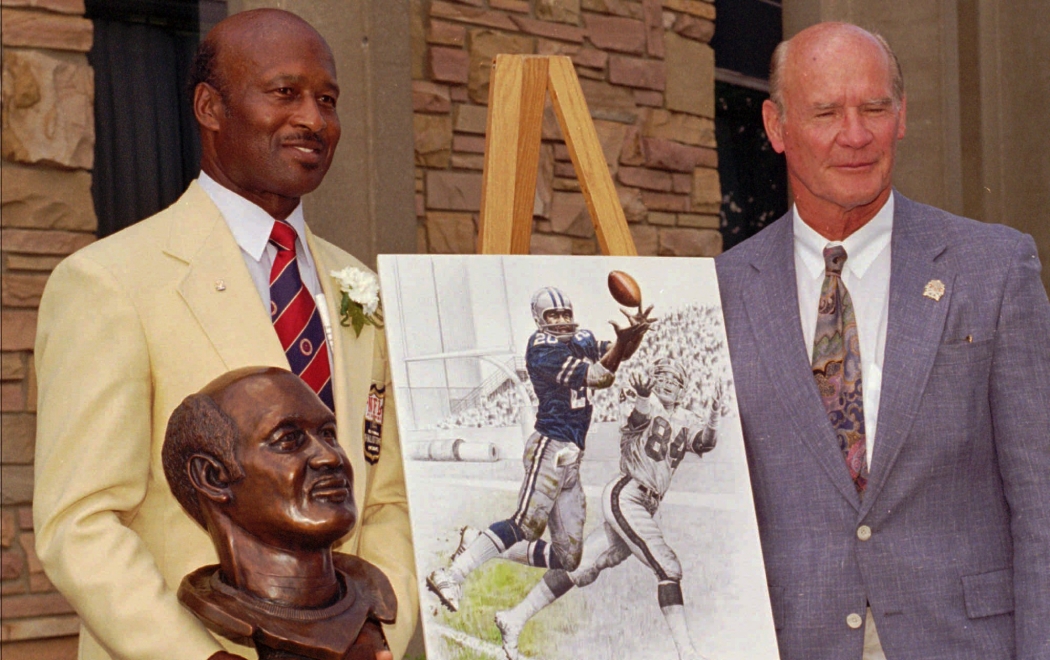Gold Jacket Spotlight: Premier Athlete Mel Renfro

Several athletes on the roster of the U.S. Summer Olympic Team in Tokyo over the next two weeks will earn millions of dollars in endorsement deals while they compete in sports that offer limited prize money.
If similar economic opportunity existed in the early 1960s, Mel Renfro might not have played 14 years in the National Football League and reached the Pro Football Hall of Fame.
Mel, the featured player in the Gold Jacket Spotlight this week, starred at the University of Oregon in two sports: football and track and field. He was a member of the 1962 NCAA national championship track team, contributing points for the victorious Ducks by placing second in the 120-yard high hurdles, third in the long jump and running a leg of the world record-setting 440-yard relay team.
At the end of the year, he was named an All-American on the track and field team in the high hurdles and the broad jump.
Following another strong season, Mel and his coach, Bill Bowerman, set their sights on the 1964 Summer Olympics.
“Coach Bowerman had me training for the decathlon – shot put, discus, javelin, long-distance running,” Mel told a Dallas TV station a few years ago in recalling how he chose football over an Olympic bid. “But track wasn’t paying much money in those days, so when the (NFL) draft came along, I was offered money and decided not to do the decathlon.”
That monetary incentive came from the Dallas Cowboys, who selected Mel in the second round with the 17th overall pick. The 1964 NFL Draft produced 11 future Hall of Famers, a record for the league, with three going to the Cowboys: Mel, Bob Hayes (seventh round) and Roger Staubach (10th round).
“They ended up with a first-round draft choice in the second round,” Mel said of the Cowboys’ fortunes.
He contributed immediately on defense and special teams, starting all 14 games at free safety and leading the team with seven interceptions. He also led the NFL in both punt return and kickoff return yardage on his way to the first of 10 consecutive Pro Bowl invitations.
Mel, who was named All-Pro five times and earned All-NFC honors seven times, led the NFL with 10 interceptions in 1969. In his 14-season career, he intercepted a franchise-best 52 passes that he returned for 626 yards. He returned 109 punts for 842 yards and 85 kickoffs for 2,246 yards – a sparkling 26.4-yard average that still ranks first in Cowboys history.
Mel appeared in four Super Bowls – two wins and two losses – with the final game of his career a 27-10 victory over the Denver Broncos in Super Bowl XII.
“It was especially sweet for me, because it was the last game that I played in,” Mel told the Hall of Fame a few years ago. “I hadn’t played much that year because I had a knee injury, and I wasn’t supposed to play in the game, but one of our cornerbacks went down and I had to play.”
Mel gave the Cowboys everything he had for three quarters.
“To be able to go out like that, playing in my last game, in a Super Bowl, going out as a champion … there was nothing like it,” he said.
Mel never got an Olympic gold medal, but he did earn some gold jewelry and a Gold Jacket.
Pro Football Olympians
NFL players have competed in the Olympics including three medal winners who have been enshrined in Canton.
The Mission Featuring Multi-Platinum Recording Artist and Songwriter Jimmie Allen
On this episode, Allen shares his gratitude for the opportunity to perform at this year’s Concert for Legends.